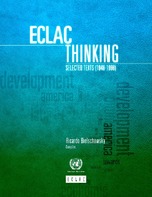Raúl Prebisch and the challenges of development of the XXI century
His history at ECLAC
The careers of Raúl Prebisch and of ECLAC as an institution are closely linked. Prebisch came to ECLAC shortly after its creation in 1948. With the drafting in 1949 of what subsequently came to be known as the ECLAC manifesto he established the framework for theoretical thinking that in the following decades would guide the work of some of the most brilliant Latin American intellectuals of the time, whom he had succeeded in attracting to the institution.

When he moved on in 1962 to lead UNCTAD, this represented not a withdrawal but rather the conquest of a new field that would give greater scope to promoting and disseminating the ideas and policies he had been developing at ECLAC. At the end of the 1960s he returned to ECLAC to direct ILPES , and he then created and edited the CEPAL Review, which served as a vehicle for his theoretical thinking until the time of his death in 1986.
Prebisch came to ECLAC in 1949, shortly after its creation in 1948, and from that time until his death in 1986 he maintained a very close relationship with the institution. Prebisch identified fully with ECLAC as did ECLAC with him, his ideas and those of a group of very close collaborators. It was Prebisch who drafted the seminal thesis, The Economic Development of Latin America and Its Principal Problems, which subsequently came to be known as the ECLAC manifesto, and which laid the basis for the doctrine focused on the particular features of development in countries on the periphery of the global system that were specialized in producing commodities and foodstuffs.
Prebisch conceived of ECLAC as a centre for research and the preparation of development policies for Latin America, deeply rooted in the specific problems of the region. He saw it as a place that would welcome intellectuals and political figures who could find no proper ambit for their work in universities and other study centres in the region or in industrialized countries.
Prebisch led ECLAC through more than a decade of feverish activity, intense intellectual vigour, and tremendous output of energy on political issues. During this time ECLAC established itself solidly as a point of reference in the region and even beyond. Its ideas had a significant impact on policies in several Latin American countries, although that impact was always very diverse and was determined by the particular economic, social, political and cultural conditions of each case. ECLAC also did much to train human resources for public management and for implementing national statistics and planning systems.
Prebisch and ECLAC also involved themselves actively in building supranational institutions, and especially in initiatives to promote regional economic integration. Although ECLAC at first gave greater emphasis to problems of external relations and the region's international integration, it soon came to focus intensively on the need to achieve Latin American integration in order to overcome the narrowness of domestic markets and give the region more political clout: during the 1960s the analysis of domestic structural, economic and social problems of various kinds was already gaining ground in the institution’s concerns, studies and policies.
Prebisch's temporary departure from ECLAC in 1963 to become the Secretary-General of UNCTAD, represented not a withdrawal but rather the conquest of fields that would give greater scope to promoting and disseminating the ideas and policies that he had been developing at ECLAC. Indeed, it can be said that the creation of UNCTAD was attributable in large part to the efforts of ECLAC in the preceding years.
Following his stint at UNCTAD, Prebisch returned to ECLAC where he took in hand the Latin American and Caribbean Institute for Economic and Social Planning (ILPES), a research and training agency that is part of ECLAC. He also maintained his ties as an advisor to ECLAC.
In 1976 he created the CEPAL Review, of which he remained editor until his death. This publication still serves as an academic forum for debating the ideas formed at ECLAC and for disseminating research work on concepts, strategies and policies that will contribute to development with equality in the region.
Related documents
-
 ECLAC Thinking, Selected Texts (1948-1998)
by
Publication Date: 2016Date Issued:2016-12 520 p. UN symbol: LC/G.2699 2
ECLAC Thinking, Selected Texts (1948-1998)
by
Publication Date: 2016Date Issued:2016-12 520 p. UN symbol: LC/G.2699 2 -
 Revista de la CEPAL - Nro. Extraordinario: CEPAL cincuenta años
Publication Date: 1998-10Revista CEPAL, No.EXTRAORDINARIO. (LC/G.2037-P)
Revista de la CEPAL - Nro. Extraordinario: CEPAL cincuenta años
Publication Date: 1998-10Revista CEPAL, No.EXTRAORDINARIO. (LC/G.2037-P)

